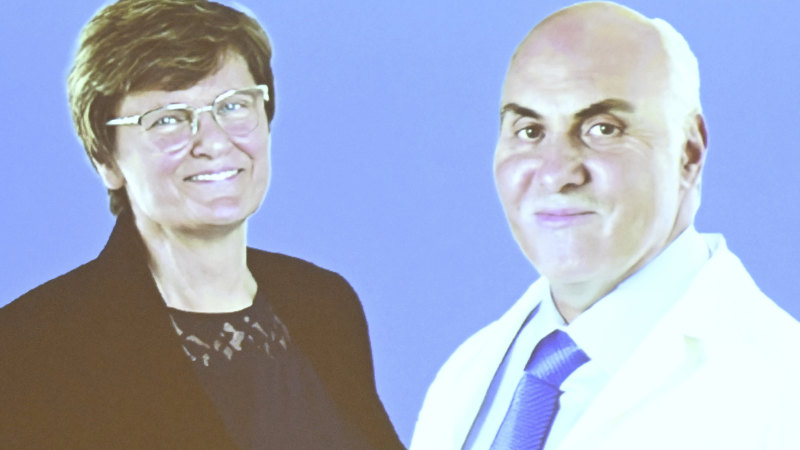Save articles for later
Add articles to your saved list and come back to them any time.
Stockholm: Two scientists have the Nobel Prize in Medicine for discoveries that enabled the development of mRNA vaccines against COVID-19 and could be used in the future to create other shots.
Katalin Karikó, a professor at Sagan’s University in Hungary and an adjunct professor at the University of Pennsylvania, and Drew Weissman, of the University of Pennsylvania, were awarded the prize for “their groundbreaking findings, which have fundamentally changed our understanding of how mRNA interacts with our immune system”, the panel that awarded the prize late on Monday said.
Dr Drew Weissman and Dr Katalin Karikó, pictured during COVID, were awarded the Nobel Prize in Medicine.Credit: Facebook/Penn Medicine
“The laureates contributed to the unprecedented rate of vaccine development during one of the greatest threats to human health in modern times,” the panel added.
Thomas Perlmann, secretary of the Nobel Assembly, announced the prize and said both scientists were “overwhelmed” by news of the prize when he contacted them shortly before the announcement.
Traditionally, making vaccines required growing viruses or pieces of viruses – often in giant vats of cells or, like most flu shots, in chicken eggs – and then purifying them before next steps in brewing shots.
The messenger RNA approach is radically different. It starts with a snippet of genetic code that carries instructions for making proteins. Pick the right virus protein to target, and the body turns into a mini vaccine factory.
A vial of mRNA vaccine developed from the discoveries of this year’s Nobel Prize in Medicine laureates.Credit: AP
Dr Paul Hunter, a professor of medicine at Britain’s University of East Anglia, described the mRNA vaccines as a “game changer” in helping to shut down the coronavirus pandemic, crediting the shots with saving millions of lives.
“If it hadn’t been for the mRNA technology, COVID would have been much worse,” he said.
“Vaccines generally were the turning point in slowing down COVID and the mRNA vaccines were just so much better than all the others”, noting that the main vaccine used in Britain, made by AstraZeneca, is barely in use anymore.
“We would likely only now be coming out of the depths of COVID without the mRNA vaccines.”
Karikó was a senior vice president at BioNTech, which partnered with Pfizer to make one of the COVID-19 vaccines. The BioNtech website says that since 2022 she has been an external consultant. She is the 13th woman to win the Nobel Prize in medicine. Weissman is a professor and director of the Penn Institute for RNA Innovations at the University of Pennsylvania.
Dr Bharat Pankhania, an infectious diseases expert at Exeter University, said that a major advantage of mRNA technology was that vaccines could be made in extremely large quantities since their main components were made in laboratories.
Pankhania predicted the technology used in the vaccines could be used to refine vaccines for other diseases like Ebola, malaria and dengue, and might also be used to create shots that immunise people against certain types of cancer or autoimmune diseases like lupus.
Nobel announcements continue with the physics prize on Tuesday, chemistry on Wednesday and literature on Thursday. The Nobel Peace Prize will be announced on Friday and the economics prize on October 9.
The prizes carry a cash award of 11 million Swedish kronor ($1.5 million). The money comes from a bequest left by the prize’s creator, Swedish inventor Alfred Nobel, who died in 1896.
AP
Get a note directly from our foreign correspondents on what’s making headlines around the world. Sign up for the weekly What in the World newsletter here.
Most Viewed in World
From our partners
Source: Read Full Article


